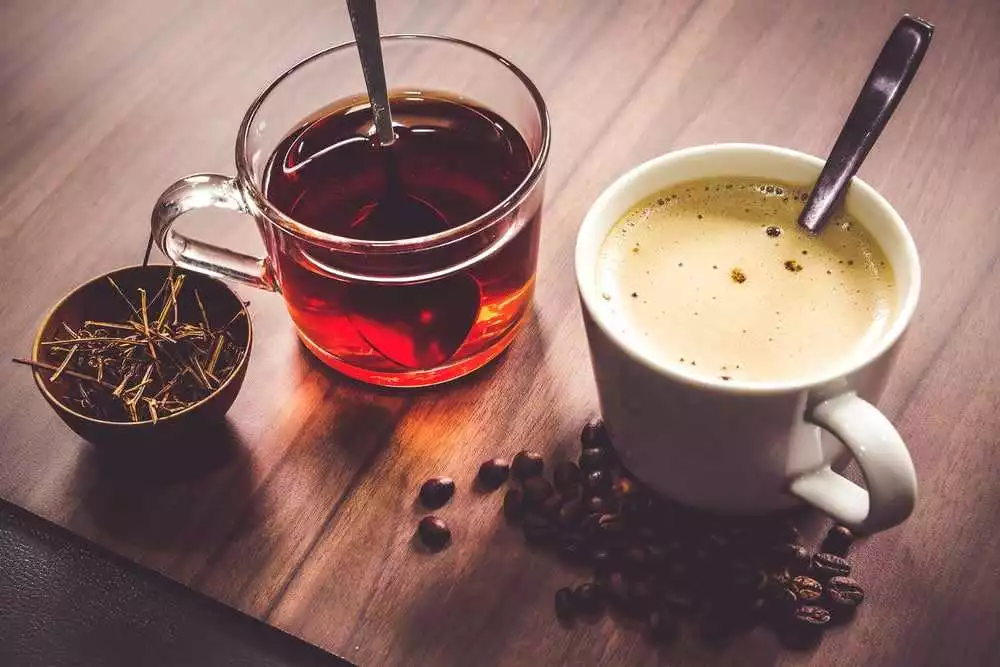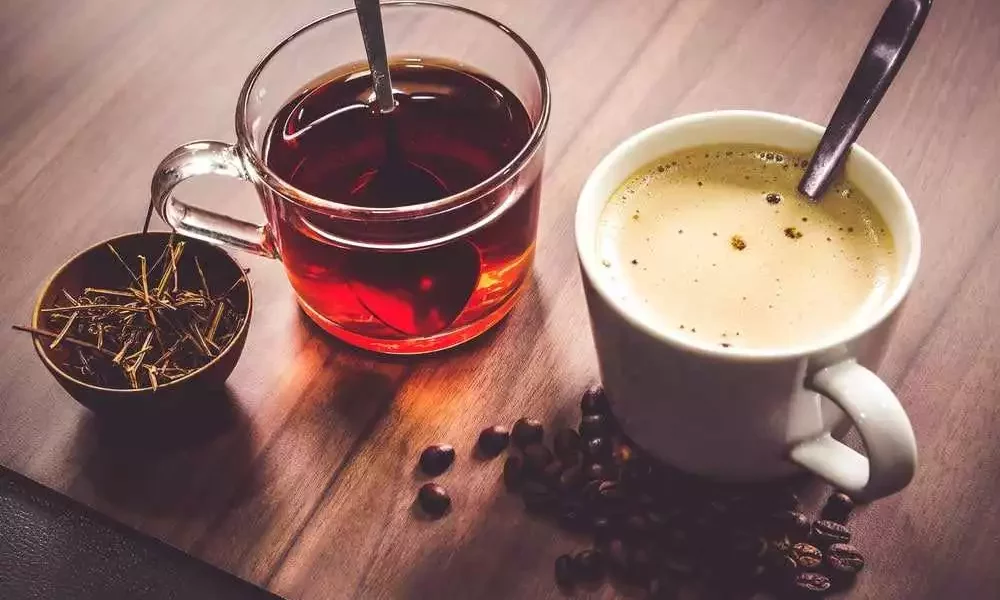Tea and Coffee
Contents
Tea vs coffee is one of the most consumed beverages around the world, even also in India.
As for a major chunk of the population tea and coffee have become an inseparable part of their daily life, but which one of better or healthier?
Both drinks contain phenolic and anti-oxidant compounds including flavonoids and caffeine, some of which have anti-cancer properties.
You should be aware of the fact that both tea and coffee were not consumed in India until a few centuries ago.
The research was published in 2016. which was said to help you feel better, whichever beverage you drink.
Check Out – What Teas are safe during pregnancy?

Tea
Tea culture in India was first introduced by the British in the year 1836.
Observational research saw that drinking 2 to 3 cups of tea daily can reduce the risk of premature death, stroke, heart attack, and type II diabetes.
There are many types of tea, and one of the most popular, and common tea includes:
Green tea: A 2011 study found that green tea was linked to significant but modest reductions in total bad cholesterol.
Black tea: Studies have found that regularly drinking black tea may help reduce the risk of heart disease.
Coffee
Coffee came to India during the late 16th century through an Indian Sufi saint named- Bob Abu.
Extensive research shows that the consumption of caffeinated coffee does not increase the risk of heart disease and cancer.
However, it is also said that pregnant women should consume less than 200 mg of coffee per day.
Because large amounts of coffee can cause damage to the uterus and are allied with low birth weight.
Caffeine Content
Caffeine is the most popular ingredient in these beverages.
The amount of caffeine considered safe for adults is 400 mg a day.
A 226 g (8 ounces) of coffee contains an average of 95m of caffeine, while a single cup of black tea has 47mg of caffeine.
100-gram – coffee contains around 40 mg of caffeine.
100 grams – Tea contains around 11 mg of caffeine.
Pros of Tea vs Coffee
Both have many benefits, but only when you consume them within the limit, and more than the advised dose can cause:
- Headaches
- stomach pain
- excessive heat
- severity issues
Weight Loss Property
Tea – One of them is green tea which comes on top of losing weight because it contains caffeine and a type of flavonoid called catechin.
Research suggests that both of these can help to speed up our metabolism and help break excess fat. and increase the amount of body energy.
Coffee – Evidence suggests that coffee is also linked to fat-burning, by inhibiting the production of fat cells.
However, some studies suggest, its effect is due to chlorogenic acid.
Caffeine alone cannot help with thinning, this can give a slight boost to weight loss efforts, and there is no strong evidence available.
High In
Tea – Antioxidants is that compound which protects body against free radicals (responsible for cancer)
As I said to you before there are many types of tea, and tea has pros in all types including green tea is most commonly allied with antioxidants.
Coffee – Coffee is also rich in antioxidants, which reduce cavities, improve moods, reduce type-II diabetes, certain types of cancer, and Parkinson’s diseases.
Antioxidants winner:
Showdown b/w – a cup of normal tea, and coffee, a cup of coffee wins the antioxidant match, because it contains chlorogenic acid (the main antioxidant in coffee).
If we compare all types of tea with coffee, tea wins because green tea and white tea contain more antioxidants than coffee.
If we compare a cup of tea to a cup of coffee so coffee is a winner in the antioxidant round.
Boost Energy
Both provide an energy boost (spark) but in their own way.
Tea – Caffeine is the main ingredient that boosts energy levels, so tea which contains a moderate level of caffeine boosts your energy, but a little bit.
However, tea reduces stress, calms down your anger, and gives relaxation, due to a unique compound present in tea called l-theanine.
Coffee – Coffee beans are higher in caffeine than tea, which means – they give you and quick energy boost, compared to tea.
However, the use of hot water in the process of making coffee extracts more caffeine from the beans.
The instant energy winner – Is Coffee.
Cons
They are good, but in a moderate amount, more than that can create concerns, because they both contain a higher amount of Tannin.
Tannin (in tea) prevents the absorption of iron in the body making it vulnerable to anemia and also triggers our yellow teeth.
Caffeine (in coffee) also has some side effects which include:
- Restlessness
- fast heartbeat
- trouble sleeping
- anxiety
- too much caffeine also promotes headaches, migraines, and high BP in some people.
Caffeine is a soft drug that gives you an instant energy and suddenly drop it, it takes a habit and once it is used, it is difficult to work without it.
What do Modern science and Ayurved say about – Tea vs Coffee
According to modern science, both tea and coffee are non-alcoholic flavoured beverages that are safe for drinking.
There are many scientific studies that show that both beverages have many health benefits.
1. Modern Science
Tea – Different types of tea are packed with antioxidants that help in-
- Boosting immunity
- reduce free radicals
- help in weight loss
- decrease the risk of cardiovascular disease.
Tea also has a compound called EGCG which helps shrink the fat cells.
Green vs black tea although green tea is one of the popular drinks for weight loss.
But according to modern science, the only difference B/W them is that black tea is fermented, while green tea isn’t.
Coffee – A 2016 report on coffee suggests that it can help in reducing the risk of certain types of cancer, Alzheimer’s, and Parkinson’s disease.
Green vs black coffee, green coffee beans contain a high level of chlorogenic acid which is known to have health benefits.
2. Ayurveda
If a particular food item doesn’t grow within a 100 km radius of your location that food item should not be a part of your daily diet.
Tea – Ayurvedic says that tea has 3 types – Vatha, Pitha, and Kapha tea, which is made of different herbs and helps detoxify the body.
According to the Ayurveda tea and coffee are highly acidic, and irritate the gut health.
Coffee – This should only be consumed when the Kapha element of the body increases, for example – if you have a fever, runny nose, sinus, and headache.
So these situations tea and coffee can be consumed in little amounts.
Both drinks should not be consumed daily, also there is an alternative option which is:
Arjun Tea, which gives multiple benefits without any side effects to keep your body, mind, and soul healthy.
How Much is Enough?
The amount of tea and coffee that you can consume every day, studies say that you won’t face any major side effects until excessive.
Drinking tea – every day in sensible amounts is good, but more than 5 to 6 cups per day can raise the risk:
- heartburn
- headache
- tongue ulcers.
However, in the winter season, you can increase your amount of cups from 1 to 2.
Coffee – According to the research, drinking 2 cups of coffee per day can increase your life expectancy by up to 2 years.
For a healthy adult, 400 mg a day (4 cups of coffee is considered safe), but more than 6 cups of coffee can enhance the risk of brain disease “Pham” says.
Which One Is Better In the Morning?
Both are better in the morning but in a moderate amount.
According to science tea and coffee work best for you, if you consume 30 minutes after a meal.
Avoid tea and coffee before sleep at least 2 to 3 hours, because it can disturb your sleep, especially coffee, which contains caffeine.
Match Winner
As we have seen that both have many health benefits, sometimes coffee is the winner, and sometimes tea.
I think both are winners in the health category if they are consumed in a moderate amount.
But according to research in 2018, statistics show that overall tea is more popular than coffee worldwide.
But Euromonitor retail sales data shows that coffee is the winner in most countries.



